This is the first of what I hope will be a weekly feature. I'm planning, optimistically, to profile a different record approximately every Thursday. I think that the title of the feature, "The Records of My Lifetime," is totally pompous, reminding me of some kind of Sinatra-wannabe doing a Vegas revue, but it's all I can think of at the moment, and is likely to change if I think up something more clever. So without further ado, I bring you....
:::::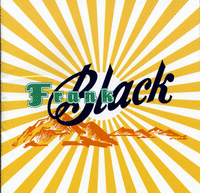 Frank Black - Frank Black
Frank Black - Frank Black
4AD/Elektra (1993)
There are arguably more fans of the Pixies now than there were when they broke up in 1993. You can break that band's fanbase into two camps by asking a Pixies fan to name the man who served as lead singer, rhythm guitarist, head songwriter, and primary oddball for that highly influential group. The first camp, likely made up of those who were a fan of the Pixies before they broke up, will answer "Black Francis." The second camp, likely made up of those who became fans of the Pixies after they broke up, will answer "Frank Black." To be nauseatingly honest, the man's real name is Charles Thompson, but it's likely only his mother and his wife call him that. I am one of the second camp; whenever I refer to the Pixies, I automatically refer to the man who led them as Frank Black. The reason for this is, following my earlier stated reasoning, I had not heard a single song by the Pixies until a few years after they broke up. My first contact with the off-kilter pop songcraft of one Mr. Charles Thompson came by way of his first solo album, where he reversed his stage name and was known forever after as Frank Black. To reinforce the name change, the album's spine, in a subtle stroke of humor, diligently lists both the artist's name and the album's title in order: Frank Black - Frank Black.
"Ironic" is one of those overused words often thrown at Frank Black and his earlier band, and often used to describe the music that came out of the oft-mislabeled genre his work was herded into: indie rock, college rock, and the hoariest misnomer of all--alternative rock. How else to describe an album whose songs include an appreciation of a distinctive style of facial hair, a travelogue from a UFO convention, an instrumental version of a song that to anyone's knowledge does not have lyrics, and one song that crests on repeated shouts of the word "Jerk"? These songs would be ironic, were there any guile invovled, and if their subject matter were meant to stand in for something other than what they are ostensibly "about". In my mind, Frank Black's modus operandi is less about irony and more to do with his own unique sense of humor, along with an appreciation of the transcendant joy that comes from coupling a good pop hook with a wry turn of phrase.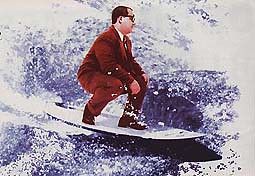 The album starts with "Los Angeles," but not the one in South California, he warns, "they got one in South Patagonia." This song shifts from a dreamy, acoustic guitar and xylophone-accompanied rememberance of a man, "...he was a good man/Sailing and shoring/He got a betatron, man," and then kicks into a superheavy metal-esque riff, where he again clarifies which Los Angeles he wants to live in, then back to the strummy part about the man, "dancing the beta can-can." It's a highly dramatic tonal shift, and it give the album a rousing start. Next comes "I Heard Ramona Sing," in which "Ramona" is the Ramones, and the song is an appreciation of one of Frank Black's favorite bands.
The album starts with "Los Angeles," but not the one in South California, he warns, "they got one in South Patagonia." This song shifts from a dreamy, acoustic guitar and xylophone-accompanied rememberance of a man, "...he was a good man/Sailing and shoring/He got a betatron, man," and then kicks into a superheavy metal-esque riff, where he again clarifies which Los Angeles he wants to live in, then back to the strummy part about the man, "dancing the beta can-can." It's a highly dramatic tonal shift, and it give the album a rousing start. Next comes "I Heard Ramona Sing," in which "Ramona" is the Ramones, and the song is an appreciation of one of Frank Black's favorite bands.
I had so many problems
And then I got me a walkman
I really liked it a lot and
They walked right in and they solved them
They walked right in and they solved them
I heard Ramona sing
And I heard everything
The speed they're traveling
They are the only thing
Ramona
One of the most memorable tracks is "Fu Manchu," which manages to be both about the mythical crime lord as well as his moustache.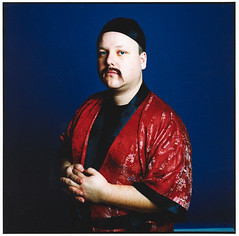 You heard about
You heard about
A criminal man of virtue
Is there any doubt
His minimal strands would suit you?
Is a hard earned way
Is a hard earned way
I'll never lose
My fu manchu
My fu manchu
Let them grow out
In time you'll feel so better
The vanishing pout
Now you're a real go-getter
Sound-wise, this song represents the production of the album well. Frank Black's vocals sound dreamy, almost effortless, and his acoustic guitar nicely mixes with the bouncy, surf-inspired bass line. Lurid counterpoint is provided by the synthetic, plastic-sounding horn section, which appear throughout the record and help give it a signature tone. Frank Black sounds slick and synthetic, less noisy and organic than the Pixies albums were. This serves to distinguish the record from his more celebrated work, for one, and second, it serves these songs well: the sound doesn't get in the way of the lyrics or the hooks, and while it draws obvious inspiration from a number of things--surf music, punk rock, the Beach Boys--it doesn't sound like any of them. This album effortlessly created a signature sound that groups like Weezer could never improve upon. In a way, the Pixies created "alternative rock" as it came to be known, and on Frank Black, the creator perfected his creation, making it sound as though it always existed.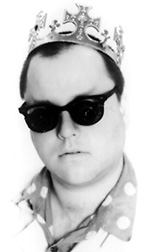 Frank Black's next record, Teenager of the Year, is considered by some people to be the best work he had ever done, and I remember once that a book was published with its sole subject being that Teenager of the Year was best album ever recorded. I think its massive length makes it less effective than the more consise Frank Black, but the opening four tracks, "Whatever Happened To Pong?", "Thalassocracy", "(I Want To Live On An) Abstract Plain", and "Calistan", come on so fast and so furious that at the very least it qualifies as one of the best album sides ever put to wax. Additionally, "Headache" is a fantastic pop song that in a weirder world, one that was listening to better pop music than Ace of Base, Aerosmith, and Green Day, would have been a massive hit.
Frank Black's next record, Teenager of the Year, is considered by some people to be the best work he had ever done, and I remember once that a book was published with its sole subject being that Teenager of the Year was best album ever recorded. I think its massive length makes it less effective than the more consise Frank Black, but the opening four tracks, "Whatever Happened To Pong?", "Thalassocracy", "(I Want To Live On An) Abstract Plain", and "Calistan", come on so fast and so furious that at the very least it qualifies as one of the best album sides ever put to wax. Additionally, "Headache" is a fantastic pop song that in a weirder world, one that was listening to better pop music than Ace of Base, Aerosmith, and Green Day, would have been a massive hit.
Needless to say, Frank Black led me to seek out the Pixies, and without question Doolittle and Surfer Rosa are albums that merit equal or greater contemplation than this one. But Frank Black is where I started, my first introduction to the weird world this man created under both of his altar egos, and more importantly, one of the records that helped show me that there was more to music than the Beatles, more than the hairy garbage being beat to death on classic rock radio, and more than the soulless "product" that continues to make people think of empty fluff when they hear someone refer to "pop music". Without Frank Black, there might not have been a Nirvana, a Pavement, a Ween, or even a Breeders, for me or for anyone else. Like the man said, "they walked right in and they solved them."
8.03.2006
The Records of My Lifetime
Subscribe to:
Post Comments (Atom)
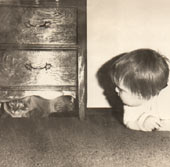
No comments:
Post a Comment